
immigration, immigrants, and the american way of life
some thoughts on the sudden immigration conflagration
in the fine bad cattitude tradition of “making everyone angry by weighing in on multiple sides of issues of current calamity” here come a whole set of takes on immigration, economy, and culture. some of it is likely to make many people mad. but let’s remember: not liking a fact does not make it false and not agreeing with everything that someone says does not invalidate the points they make.
this one seems to have really brought the bats down from the rafters and i’m sure we’ll get a comments section for the ages, but please can we do 2 things:
stay respectful and reasoned rather than nasty and emotional. this is not about tribes and making it tribal prevents the emergence of consensus, understanding, and reason. we need not agree on all things to learn from one another.
make an effort to engage with what others are actually saying, not with some version of their view that you are making up and ascribing to them. nuance is our friend here. let’s be sure to invite him to the table.
i wrote this all with no outline and in one draft (i do that a lot, i hate editing) this morning and the ideas range around quite a bit and it’s much longer and broader in scope than i planned but sometimes you just get writing and well… yeah. i’ve probably said some things less well than i could and not fully developed some ideas, but i wanted to get this out.
please apply the golden rule of “reading with the charity with which you in turn would like to be read.” this was a lot to try to pull together.
ok, game on.
here we go.
for those not on twitter, the last couple days have been an immigration food-fight seemingly kicked off by vivek saying some mostly smart stuff in highly tone deaf fashion and elon wading into it without much finesse or calibration and then wave upon wave of “telephone” amplifying and distorting messages into straw men of utmost flammability used to feed both racist trolling indians (dot, not feather) and nativist american economic illiterates alike pitting the worst, least informed, and least representative of two factions against one another in a horizon to horizon frakas to see who could be more offensive. it was rage farmer valhalla. welcome to the internet. there’s not really a helluva lot one can do about that apart from let tempers cool and then see if anything useful was learned.
what i learned was this: there’s some dangerous entitlement and reality denial on both sides and some folks clearly want a fight on this issue and that looks scary, but the reality is far less worrisome:
there’s actually mostly agreement here (especially that nearly everyone including vivek hates the H-1B program)
the problem is that everyone is focusing on the wrong question
back on thursday morning, certain overly optimistic kitty cats woke up to think “hey, normal day, let’s see if we can have some discussion about some of the relevant points of interest in ideas of immigration.”
emphasis on “overly optimistic.”
twitter rapidly devolved to poo and then rock and then actual bomb throwing, and so i basically said, “yeah, this is not going to be place to have much in the way of productive discourse in the near term” but as things have now calmed down a little and at the risk of kicking nests of at least somewhat quiescent bees, i’d like to go back to some themes that seemed lost or ignored in the great christmas immigration conflagration.
let’s see if we can set the stage with some shared belief.
some salients:
human capital will be the most important capital in the world for the next couple decades. being “the best AI builder in your town” will be basically meaningless in global markets.
human capital exists in many places both in the US and abroad.
the question is how do we develop it and under what conditions can that capital thrive?
auron (who i like and respect and whose precise text is excerpted below) was asking a question about “well, if foreign human capital is so great, why does it not do great things at home?”
this is my answer:
because human capital is only useful in systems where human capital can flourish and realize potential. it’s like asking why the son of an NBA player never got good at basketball while ignoring the fact that he was raised in a cave with 5 foot ceilings and never allowed outside or to stand up straight.
human capital may be easily thwarted. the soviet union did not lack for smart people. it lacked any outlet or incentive for them to build things.
human capital requires and creates freedom, systems, and structures to thrive. it requires an ethics and ethos where such thriving is encouraged, enabled, and protected.
and that is what has for generation after generation attracted so many of the best and brightest to america.
america was the preferred place to chase and build your dream and pursue your happiness.
the “activator” is real. the activator is america. one can do here that which cannot be done in china or india or japan or france. the ceiling is raised.
martin, who i do not know but who seems like a reasonable guy engaging in good faith then asks this.
i don’t mean to single him out and please don’t dogpile him, it’s just a good sort of socratic question and honestly, the kind of civil and potentially productive engagement that make social media useful. and i think he’s correct about the sides talking past one another. i’d like to explore what i see to be the disconnect.
firstly, i disagree on one matter: we do need more start ups, silicon valley or otherwise. that said, it matters a great deal what kind of “silicon valley start up” we’re discussing. the old kind was awesome. many of the new ones are a blight, but this does not mean that all or even most are, just the biggest and best connected that gather so much limelight and lucre.
i was there in the 90’s and 2000’s. the hot new tech at the time was a thing called “the internet.” it turned out to be pretty useful and it really could only have emerged at the kind of speeds and capacity that it did in a place like sili-valley and anyone who thinks “bUt DARPA wOUlD hAvE INvenTeD it AlL!” simply has no idea what happened.
the problem is that the culture of hard work, big risks chasing big visions, and endless hyper-competitive creative destruction has atrophied and been replaced by something else: big business tactics of crony corporatism and aristocratic capture of political systems. this has turned the ethos on its head.
california ate the valley.
i barely recognize the place. sand hill road might as well be lobbyist row in maclean virginia. VC’s hire al gore to make sure their portco products are mandated. PE buys up all the HVAC installers then pushes new air handling rules for covid and mandated heat pumps.
as a result, i think that many of vivek’s own words may be turned against silicon valley (in a manner, incidentally, that i suspect he would agree with).
he states:
“A key part of it comes down to the c-word: culture. Tough questions demand tough answers & if we’re really serious about fixing the problem, we have to confront the TRUTH:
Our American culture has venerated mediocrity over excellence for way too long (at least since the 90s and likely longer).
That doesn’t start in college, it starts YOUNG.
A culture that celebrates the prom queen over the math olympiad champ, or the jock over the valedictorian, will not produce the best engineers.”
and there is obvious truth here albeit also truth that misses the fact that engineers tend to make lousy CEO’s and visionaries and that “winning the math olympiad” and “being able to build a high function organization” are often at odds with one another. i, for one, love to hire athletes because they come with drive, discipline, desire to win, and a hatred of losing (which is not the same as desire to win). his take gets a bit myopic and nerd centric. (i say this as both a jock and a math olympiad winner)
“all math no outside life” is not a path to innovation. ask china.
but to get to the real insight, problem, and bifurcation, let’s substitute “crony corporatism” for “mediocrity” and “connected political activist paying for play and wrapping themselves in platitudes of diversity, equity, and servitude to false collectivist problems ginned up to demand expensive mandates for collectivist solutions to justify this” for “prom queen” and “jock.”
because this is the real divide, the part many of the tech bros are missing, and the reason so many are finding them so infuriating.
i think people are talking past each other on this because the debate has been framed incorrectly leaving the truly important issue to go begging.
sili-valley is appealing to what it once was but, like so many american institutions, it has lost much of the virtue that underpinned such institutional and cultural conception.
instead, a tone deaf aristocracy advantaged by subsidy, connection, and diversity and equity edict is mocking those who are forced to give up their places (and worse their culture) to it and telling the same people who can no longer get into top schools based on merit that they are failing at meritocracy and that hiring that slants heavily against their inborn characteristics is somehow their fault for going to prom.
“why didn’t your race attend the engineering school that discriminates against your race or gender?” is not much of an argument.
the wokelord google gang is not the “proof of fitness” test it claims to be (and is, frankly, failing badly now as a result and will soon be an irrelevancy if it does not get its act together)
you don’t get to grab spots at university with skin tone and market share with regulatory capture and then claim meritocracy.
this is self flattery of the most excremental form.
silicon valley has become a crony corporate hypocrisy hill.
and that, ultimately, is why people are so pissed.
you don’t get to use lawmakers to force me to buy solar panels and to pay for huge subsidies for others who do and then brag about being a genius and a corporate visionary for saving the world from a fake “problem” you pay publicists to convince the public is real.
that’s not technology cultivation, it’s tax coercive farming.
vivek did not put his case especially well, but that does not mean he’s wrong.
to see if we can’t get to the bottom of this, let’s look at some basic economic and incentive reality:
workers do not want to compete with foreign labor just as companies do not want to compete with foreign producers. everyone would like more pay or more profit with less effort.
but one way or another, such competition will always emerge because the alternative is far worse.
the "don't import the workers!" issue is a fallacy because if we don't, these same consumers will just buy more foreign made products and US jobs will be lost to it.
unless you never buy foreign sneakers or autos, that's how it works and consumers are certainly not going to agree to the same stricture of “you cannot hire from abroad if you could hire locally! just pay a higher price!” when told “you cannot buy a foreign made stereo system if US makes them too!”
they rapidly discover what US made amplifiers and speakers (the best in the world BTW) cost. you want a $500 stereo, not a $5,000 or $50,000 one. fair enough. but unless folks are going to agree to pay $4 a banana and that kiwis are now priced like jewelry and only buy american, goods are going to cross borders and consumers will benefit from it.
saying “no hiring foreign workers” and then buying foreign products made by foreign workers in foreign countries is hypocrisy, but saying “so only buy american” generally winds up worse.
the US tire tariffs notoriously cost over $900k per “job saved.” the tiremaker job is highly visible while the expense widely spread so only the “benefit” is apparent and the cost hidden but with so much money flushed as deadweight loss to consumers, obviously many more than one job were lost per job supposedly saved. that $900k disappeared from somewhere. you just never meet the guy who ran the ice cream parlor that went out of business or understand why it did. he himself likely does not know.
labor is not magic. however much people would like to pretend, it’s not some special class of good immune to economic forces. it works just like anything else and is subject to the same forces and incentives.
there is foreign talent in the world. we can either import it or import the goods it makes, hire it here and sell it groceries or outsource tasks to teams abroad. assuming that "all the jobs would just exist for americans if we keep workers out" is economic fallacy and reality denial of the same order as “tariffs protect US jobs.”
on balance, they do not and cannot.
this whole fight is mostly a fight about nothing rooted in utopian ideas that protectionism actually affords protection.
it does not.
this is not really even an interesting question.
when really looking at production possibility, the interesting question is "would that foreign talent be more effective in the US where the rules and institutions are more conducive to realizing potential?"
i think that the answer is "yes."
i think we can say that “yes, if we attract this talent and these founders that more will be made of it in america than could be elsewhere.”
musk and others have advanced this argument, but have perhaps missed a broader issue:
this is only true if america remains america, the fertile crescent for human capital.
and this is the part where i think we’re getting lost.
the real issue is less about jobs and more about culture.
When you see that trading is done, not by consent, but by compulsion–when you see that in order to produce, you need to obtain permission from men who produce nothing–when you see that money is flowing to those who deal, not in goods, but in favors–when you see that men get richer by graft and by pull than by work, and your laws don’t protect you against them, but protect them against you–when you see corruption being rewarded and honesty becoming a self-sacrifice–you may know that your society is doomed.
-ayn rand
the US was perhaps the largest and most successful example in history of a high trust high freedom society. few other societies are. china is not. india is not. japan is not nor russia nor africa. latin america has not managed it. it's basically an institution confined to small parts of the west.
this allows for forms of thriving that cannot exist outside a paradigm of "golden rule" and for an expectation of consistently winning economic and ethical prisoner's dilemmas by not defecting, keeping our word, and not cheating one another as a base case outcome.
i wrote a think piece on this about a year ago. you can read it HERE. the essence is this:
no golden rule, no golden age.
you mess with it, you collapse.
as soon as any meaningful portion of people start to take advantage of a system to steal from and coerce others, high trust collapses and along with it prosperity and safety and comfort. trade begins in favors and pull rather than in goods.
and this is where immigration and the lunacy of DEI/ESG (and i do not think the two are unrelated) all come into play. it’s worth remembering that this is the avowed ethos of most of the world. it is not seen as amoral or unjust, it’s seen as fact or even ethics. you push your group over others. honesty and justice are irrelevant except inasmuch as you can use them to fool people into letting you win.
where we get into real trouble if when we lose the idea of assimilation and melting pot and start importing large groups of people who do not share these high trust morals and practices because to do this is to threaten not only what makes our economy so dynamic, but also what makes america a pleasant and safe place to live.
all this "who took whose job?" and "could it have been saved without costing many others?" rapidly becomes a rounding error once you put the whole system of "golden rules driving golden ages" on the table and start to invoke the kinds of nepotism, government and regulatory capture, cheating, thieving, and other such low trust/low function behavior that has been on such a rise.
to the extent that you lose that system, human capital becomes increasingly irrelevant.
however fecund they may be, you cannot grow seeds in asphalt.
this is the core constraint that drives the others.
in many parts of the world, "control the government so your group gets to control who takes whose stuff" is the core process, understanding, and morality.
in such an ethos, ideas like DEI and preferencing seem natural and desirable. ESG is just a glossy justification brochure to make people buy your solar panels and hire people who look like your kids.
i keep watching minneapolis get rugged over and over by the somali immigrants through covid fraud, welfare fraud, medicaid fraud. every time i’m in an uber there, the driver is somali. i like to talk to people and so i talk to them.
all are proud to be in the US and especially proud to see the somalis taking roles in government and city councils. nearly all rapidly and unashamedly veer into “and this gets us lots of free stuff.” they do not see it as a thing to conceal but rather a brag.
in most of the world, this is not considered controversial: the purpose of government is to control who gets what stuff and you and your tribe seek to take control and get the goodies. that’s the base state of humanity. it does not go away when humanity immigrates, especially en masse as it has.
trust has been torn to flinders. i hear the locals speak of how they will no longer go to downtown. even the uber drivers will not take you to many parts after dark. what was one of the safest, highest trust cities in the US has devolved into a no go zone. it does not take a huge impetus to cross this tipping point, especially if the local authorities aid and abet it by screaming “racist” at anyone who objects.
if you want to make immigration work, immigrants need to assimilate. the value of the american way of life far outstrips any contribution they could make if their presence undermines such social fabric.
america is more than an idea.
america is more than a place.
america is a way of life, a set of expectations, a golden rule begetting a golden age.
there’s an interesting framing here around “bound vs protected.”
bound means constrained by rules.
protected means defended by the system.
golden ages take root in the universality of being bound and protected. we follow the golden rule, respect the rights and property of others, and the system in turn protects us and ours.
what we have today is fracture of this, a turning of it into a system of patronage and oppression.
groups within the US (ostentatiously including many immigrants) are protected but not bound. law does not apply to them. they cheat, steal, rob, and murder. the system protects them, pays them, refuses to hold them to law or account. it’s your fault if they do bad things or bad things happen to them. they get special privileges, special entry, and mountains upon mountains of cash, free food, free housing, free phones, and free license. you sneak in and get your high value prize bag.
meanwhile, team “golden rule” is bound but not protected. they must follow rules and get absolutely creamed if they don’t. when they get assaulted on the subway, they get arrested for resisting or for protecting others and cast into years of punitive process as punishment and possibly prison. those who rob or burn stores may not be impeded and those who own those stores risk life and livelihood to stop such offenses. we’re subsidizing an invasion of corruption and criminality, some home grown, some imported, all of it anathema to america.
if you want to see the real immigration flashpoint: that is where it lies.
“why do these immigrants get more rights than i get and why am i paying for it?” is a valid question and one certain to enrage as there is no good answer to it and being told to shut up about it because “racist” ain’t gonna cut it.
the flashpoint lies in schools and streets and a home culture being dissolved in rampant abuse of systems by those to whom “high trust, high freedom” is a foreign idea.
but part of the problem is that they are adopting our ideas.
they are acting as we allow many locals to act. it’s precisely because we allow many locals to act in this way that newcomers have such a well worn path to follow. they just come in and join a parade in progress.
they start selecting to come because of the parade in progress.
and that’s a problem. selection becomes adverse.
this is NOT who we want to be attracting.
the inscription on the statue of liberty is “give me your tired, your poor, your huddled masses yearning to breathe free” not “send me your grasping and hostile yearning to take that which belongs to others by playing upon the empathy of a system that has no experience with such pernicious forces.”
that’s not where flourishing human capital comes from.
that’s where societal ruin comes from and such ruin ruins ALL human capital, foreign and domestic alike.
“come and strive, it’s hard here but you can make it” is different from “come and game the system, these people are chumps.”
musk himself needs to be a bit careful on this issue. tesla came to be as the result of massive subsidies to EV buyers and elon played every angle here to abuse and gain advantage from a system to the point of having earned (accurately in my view) the moniker “subsidy truffle hound.”
as the system has now turned against him, he’s had quite the change of heart, perhaps because he legitimately learned something perhaps simply because where one sits is such a keen driver of where one stands, but this is sort of irrelevant.
he’s now right. so is vivek.
and really, (and counter to what one might think from the last couple days in the twitterverse) most of us agree.
see for yourself. (watch video HERE)
this is about preserving the US national identity.
what is occurring with immigration is opportunistic infection because we have ourselves blown it on US identity.
we let the economy become crony corporatist, locking connected firms into positions of power with regulatory and bureaucratic rule and diktat. we made it cheaper to buy politicians than to compete in the marketplace, pushed influence markets over free markets.
we erected predatory structures like H-1B that set up sorts of indentured servitude that preferences the big companies who can navigate this maze at the expense of the small who cannot and allow below market rate workers to be retained because they are bound to the firms who brought them in and cannot easily change jobs.
we made DEI and ESG the core learnings of schools and raised deluded children expecting every day to be everyone gets a trophy day and believing that any failure on their part was some sort of structural bigotry.
we made universities into hothouses of radical aggrievement theory by allocating their places by race and performative gender malfunction.
we vilified the people and the values that underpin the american way of life.
we subsidize cronyism and failure, penalize success, and demand that all big business exist beneath the wing of state protection and patronage. this last word is pivotal. we have become a patronage society and we’re inviting and elevating those seeking to make it worse.
are we really surprised that our immigration policy mirrors this?
the way to “fix immigration” is to rip out all this crap.
stop paying for it. stop handing out free stuff to those who sneak in and stop accepting as native those born here of illegals. create some sort of broader guest worker program that allows work but not benefits, that taxes but does not subsidize. free it from the capture of H-1B. and then stop treating people differently based on inherent characteristics.
the US has become a stupidity of special preference and regulatory advantage.
nothing, including immigration, can truly be fixed while this persists (though getting control of the borders would be a decent start).
peel it all apart and most of these problems will go away and such as remain will be easy to see and abate.
make america meritocratic again.
preserve the high-trust, high freedom american way of life.
we are a nation of immigrants. nearly all of us were at some point. my great-grand parents were. they came in huddled masses yearning to be free. my grandparents started bars, worked as firemen, worked in banks. my parents were the first generation to attend college. it was hard. it was the depression. but merit rose. it’s the american way and can and should be again.
this is all of a piece and most of the pieces are ones upon which most of us agree.
it’s good that we can have big, wide ranging debates and dispute that which seems needful of disputation. it is good to be a big tent of many ideas. but it’s also important not to ossify into pastiche by forgetting what binds us together, what the real goal is, and by rarifying into echo chambers of our own whereby we do not even listen to one another but rather talk past because we’re making up one another’s views and arguing with men of straw instead of people of ideas.
this is not the time for internecine strife.
it’s the time to pick this thing back up and getting spinning as it should again.




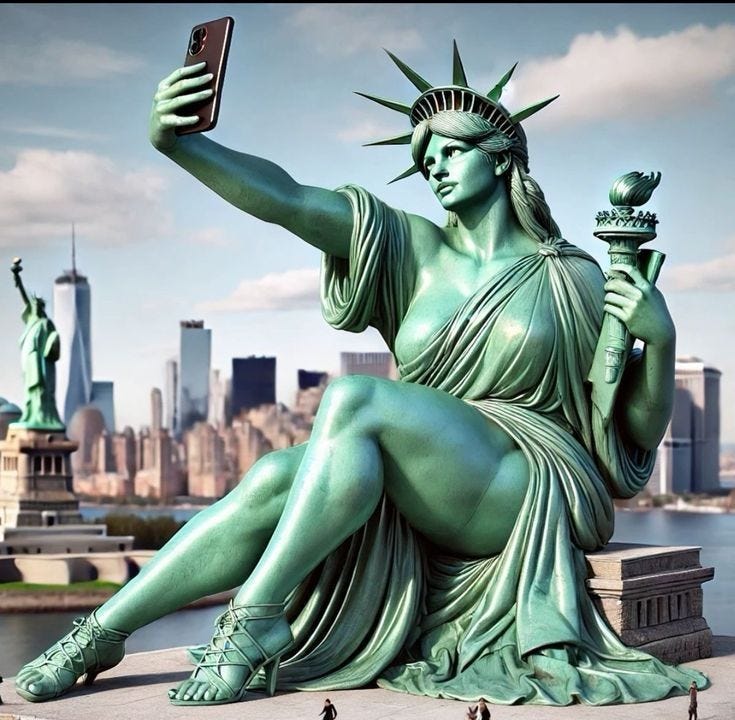
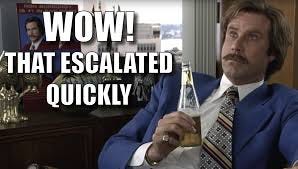
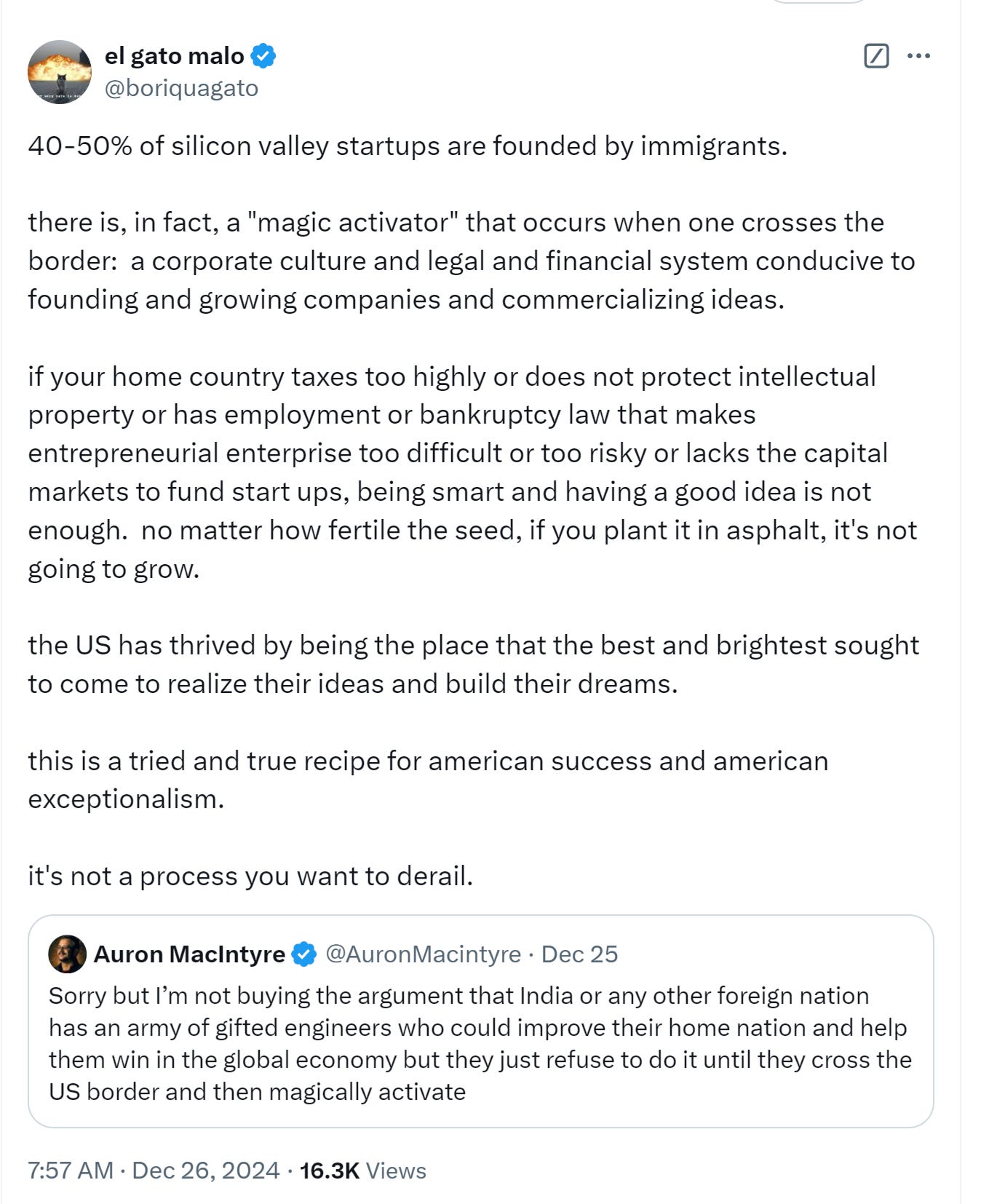




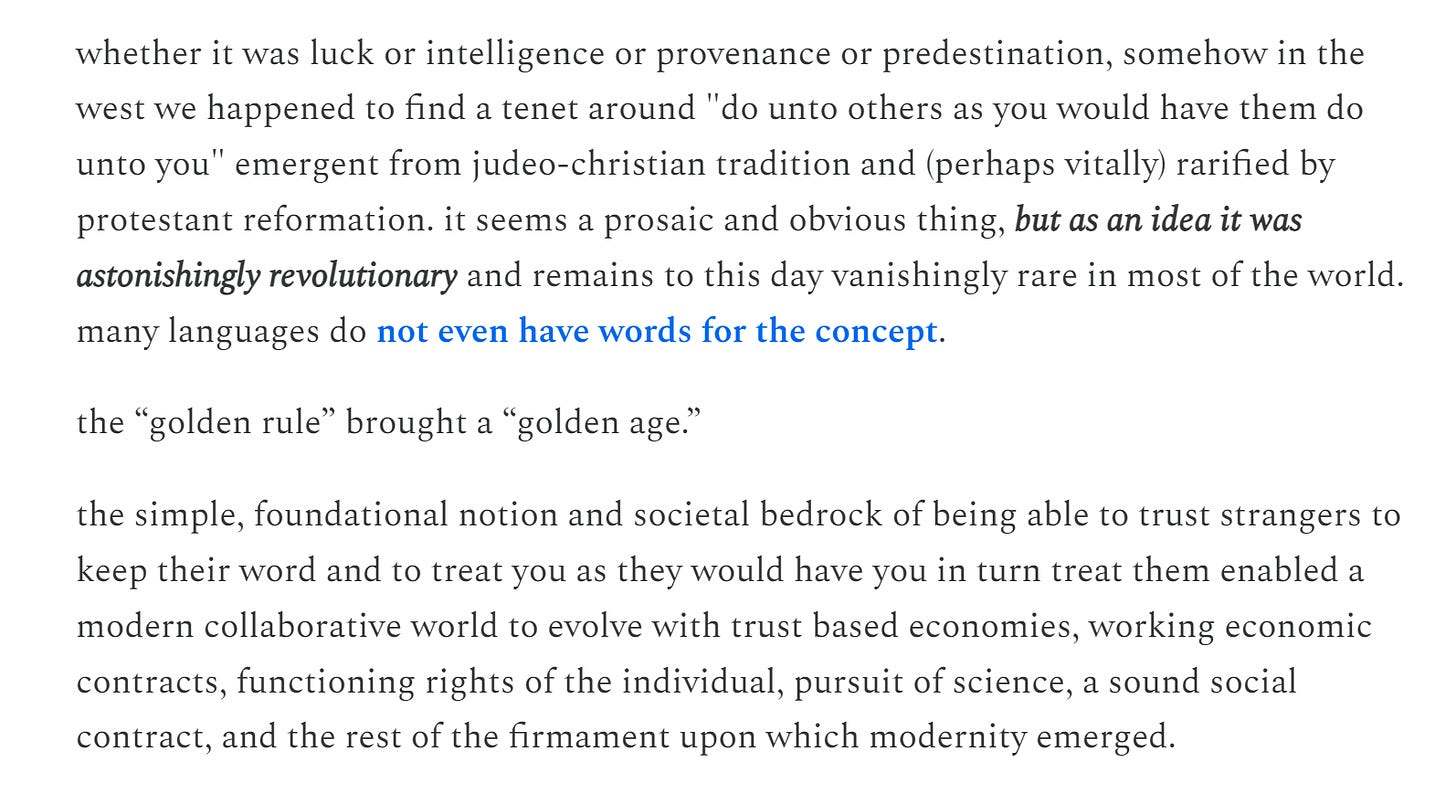

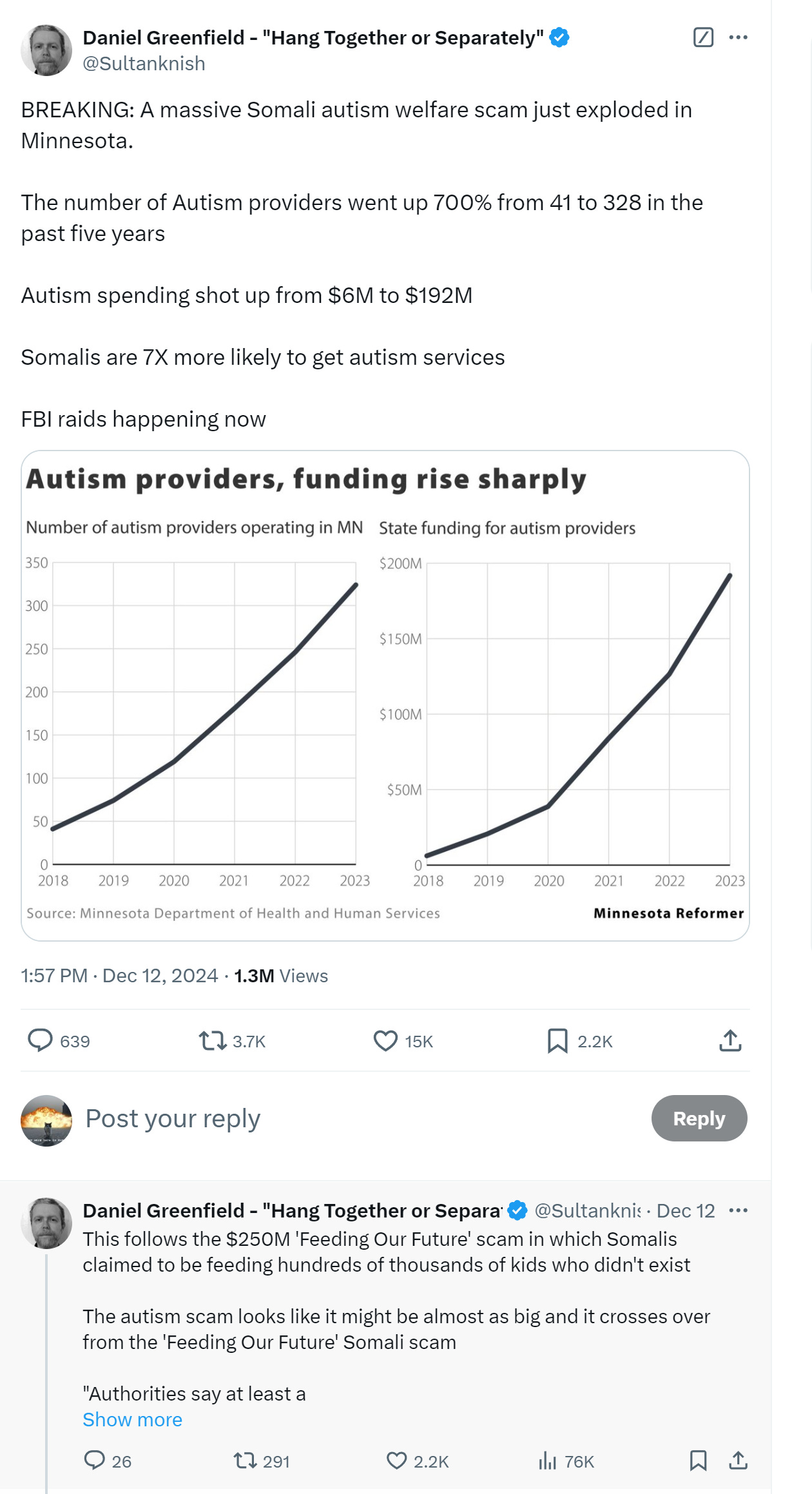















I'm still trying to find the controversial part of this.
The crux of the problem and the solution is stated in just a few words-
"where we get into real trouble if when we lose the idea of assimilation and melting pot and start importing large groups of people who do not share these high trust morals and practices because to do this is to threaten not only what makes our economy so dynamic, but also what makes america a pleasant and safe place to live."
AND
"stop paying for it. stop handing out free stuff"
AND
"make america meritocratic again."